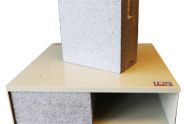EM smart materials, also called metamaterials, artificial materials or engineered materials, are being used increasingly in electromagnetic engineering. They can be defined in many different ways, one of which is to apply the following qualitative definitions, which highlight the practical advantages that can be obtained through them:
- They are structures that offer uncommon electromagnetic properties, usually very different from those obtainable from natural materials.
- The use of these materials makes the creation of advanced boundary conditions possible.
IDS provides solutions for the following smart material types:
- Thin RAM (radar absorbing materials) panels (CA-absorbers)
- Thin RAM built into structural parts (RAS, structural CA-absorbers)
- FSS (frequency selective surfaces) on any kind of supporting structure (e.g. radomes, glass, walls and building works)
- Hard/Soft surfaces for EMI control
- PSS (polarization selective surfaces)
- EBG (electromagnetic bandgap) panels
- AMC (artificial magnetic conductors) ground layers for low-profile antennas
- MTS (metasurface) antennas
Smart Material Main Applications
Both defense and civil environments can benefit from the properties of this new class of materials.
In the defense field:
- Development of next generation air and naval platforms (stealth technology)
- Minimization of the co-site interference between elements of complex radiant systems
- Lengthen the life cycle of an old platform, making them suitable for new operational scenarios (refitting & optimization)
In the civil field:
- In the frame of intelligent buildings, capable of re-shaping electromagnetic propagation in internal spaces, in accordance with changing future needs of LANs (Local Area Networks) and according to security requirements
- To provide smart electromagnetic windows, maintaining aesthetic requirements of the building
- To provide very light and low encumbrance antennas
- To produce more energy, by means of the construction of wind farms with maximum efficiency without worrying about restrictions due to interference with air traffic equipment
These smart material solutions include:
- Electromagnetic modeling tools, specifically developed for both smart material analysis and design
- Smart material analysis and design services
- Smart material measurement systems and qualification services
- Development of custom smart material products, on the basis of customer requirements
- Off-the-shelf smart material products




